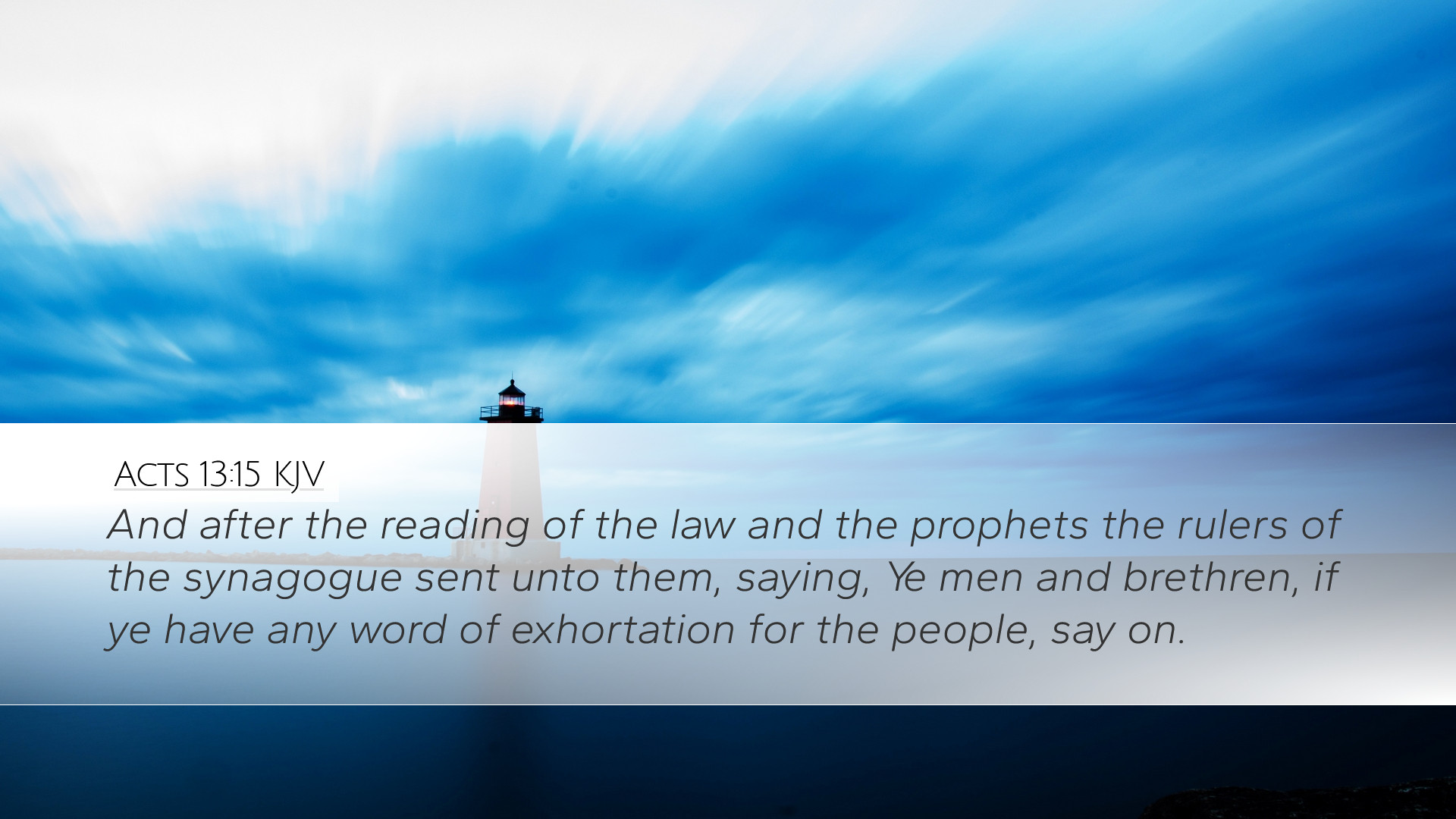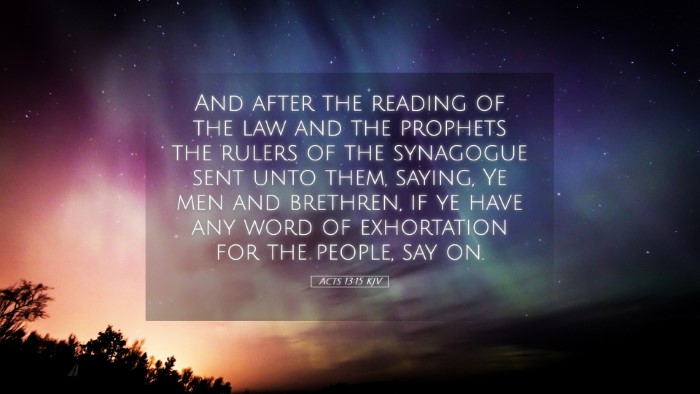Commentary on Acts 13:15
Acts 13:15 states, "And after the reading of the law and the prophets, the rulers of the synagogue sent unto them, saying, Ye men and brethren, if ye have any word of exhortation for the people, say on."
Introduction
This verse is significant as it marks a vital moment in the early church's mission to spread the Gospel. The invitation to speak given to Paul and Barnabas reflects the practice of the synagogue, where scriptures were read and expounded. In understanding this passage, we can draw insights from various public domain commentaries to grasp its theological and practical implications.
Contextual Background
As Paul and Barnabas entered the synagogue, their presence was marked not only by their identity as Christians but also by the respect afforded to them as learned men within a Jewish setting. Matthew Henry provides insight into the customs of the time, noting that synagogues were centers for scriptural discourse and community.
Reading of the Law and the Prophets
The phrase "the reading of the law and the prophets" is crucial for understanding the Jewish practice. It denotes the sacred texts that were foundational for Jewish faith and identity. Albert Barnes explains that this reading established the connection to the heritage from which the early church emerged, as both the law and the prophecies pointed towards the coming Messiah.
-
Law: Refers to the first five books of Moses, encompassing the covenantal laws given by God to Israel.
-
Prophets: This includes the historical and prophetic writings, which reveal God's ongoing relationship with His people and foretell the coming of the Messiah.
The Role of Synagogue Rulers
The rulers of the synagogue played a critical role in Jewish worship and community leadership. They were responsible for the maintenance of the synagogue and for overseeing the worship services. Adam Clarke highlights that their request for an exhortation reflects both a respect for the Holy Scriptures and an anticipation of the new teachings brought by Jesus Christ's followers.
The Invitation to Speak
The call to Paul and Barnabas, "if ye have any word of exhortation for the people, say on," reflects an openness within the Jewish community to hear new perspectives. This moment illustrates the paradigm shift as early Christians began sharing the Gospel in Jewish settings. Matthew Henry notes that this was a pivotal opportunity for the apostles to share the message of Christ and emphasize the fulfillment of the law and prophets.
The Nature of Exhortation
Exhortation in this context implies an encouragement that leads to deeper understanding and conviction. Paul's subsequent address is a direct response to this invitation, fulfilling the call to spread the Good News. As highlighted by Albert Barnes, this represents a significant model of evangelism: seizing opportunities to declare the truth of the Gospel within familiar cultural contexts.
Theological Implications
This moment in Acts not only underscores the continuity between Judaism and Christianity but also raises essential questions for modern interpreters about how the church engages with its cultural heritage. Adam Clarke points out that the invitation signifies an inclusive approach to faith where differing beliefs can be dialogued. The church today can learn from this approach in its mission efforts and community interactions.
Application for Today’s Church
For pastors, students, and scholars today, Acts 13:15 serves several practical applications:
- Seizing Opportunities: Like Paul and Barnabas, Christians are called to recognize and embrace opportunities to share their faith in various contexts.
- Understanding Cultural Context: Engaging with cultural practices and beliefs openly allows for meaningful dialogue regarding faith.
- Exhortation and Encouragement: The importance of exhortation remains vital in preaching and teaching, urging communities towards greater understanding and application of Scripture.
Conclusion
Acts 13:15 encapsulates a rich moment in the early church's mission. By engaging with the text through the lenses provided by respected public domain commentaries, we understand the historical, theological, and practical layers of this invitation to speak. The verse reflects not only the beginnings of Paul’s mission but also serves as an enduring lesson on the importance of context, culture, and God’s ongoing revelation through His Word.


